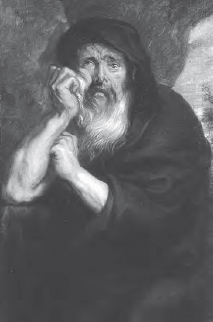Ancient PhilosophyGreek Pre-Socratics |
Why was Pythagoras important? |
Pythagoras (c. 570–495 B.C.E.) is credited with inventing the word “Philosophia.” He was born in Samos but settled in Croton, where he founded a brotherhood that was a school, a way of life, and a set of religious and political beliefs. Pythagoras discovered that the musical interval marked by the four fixed strings on seven-string lyres could be explained by ratios of the numbers 1, 2, 3, and 4. This was an important realization that forms the basis of the concept of harmony in music. Pythagoras went on to explain how number systems correspond to natural phenomena such as the movement of celestial bodies. Pythagoras’ insight about mathematics is relevant today, because mathematics is the language of modern physics.
Pythagoras and his followers also had a great interest in numerology and theories of the mystical significance of numbers. They embraced music as the spiritual side of number and believed that the right practices—in daily habits and diet, as well as playing musical instruments—could enable them to hear the music of the stars and planets. They were strict vegetarians, except for a prohibition against eating fava beans.

